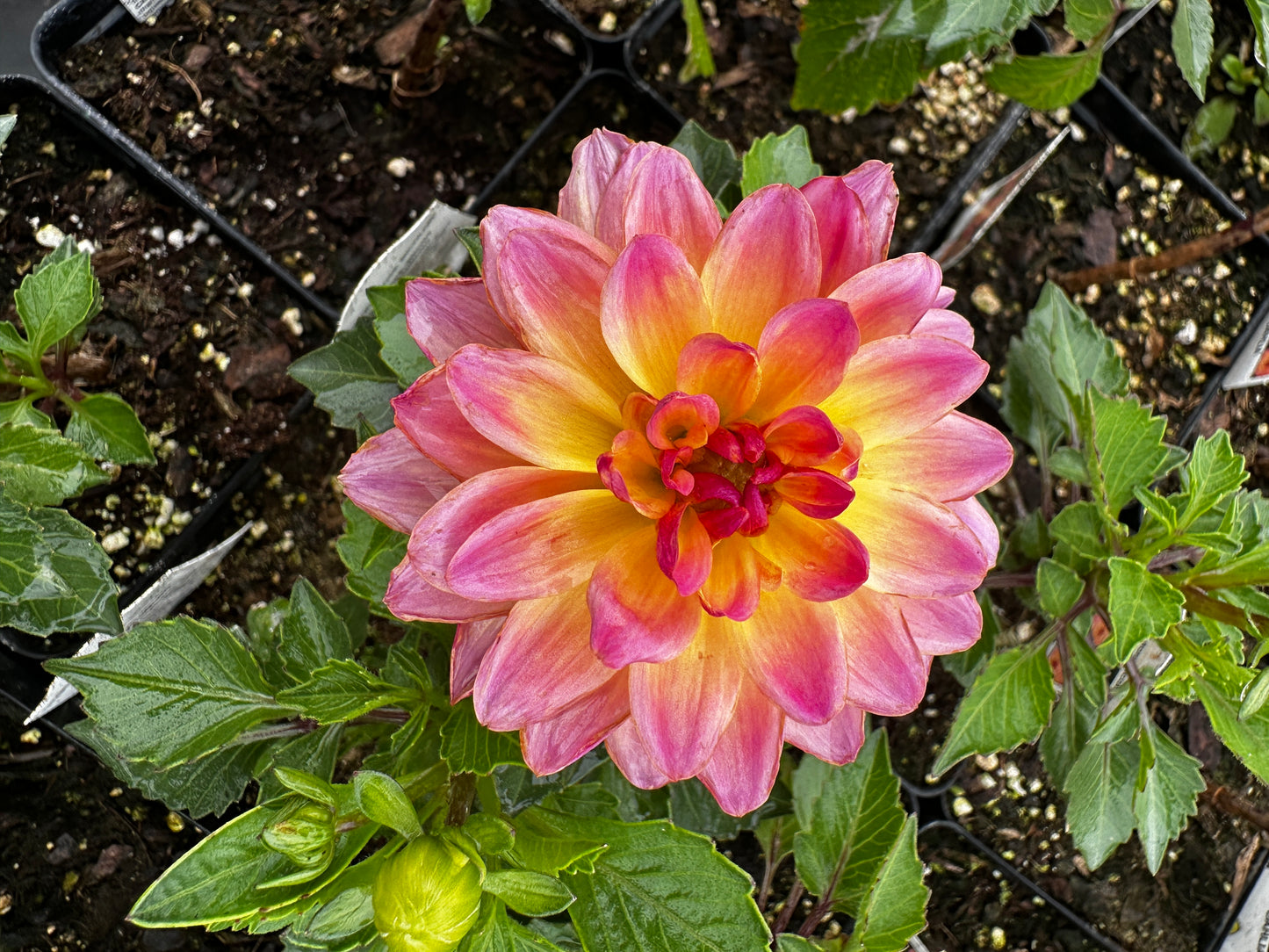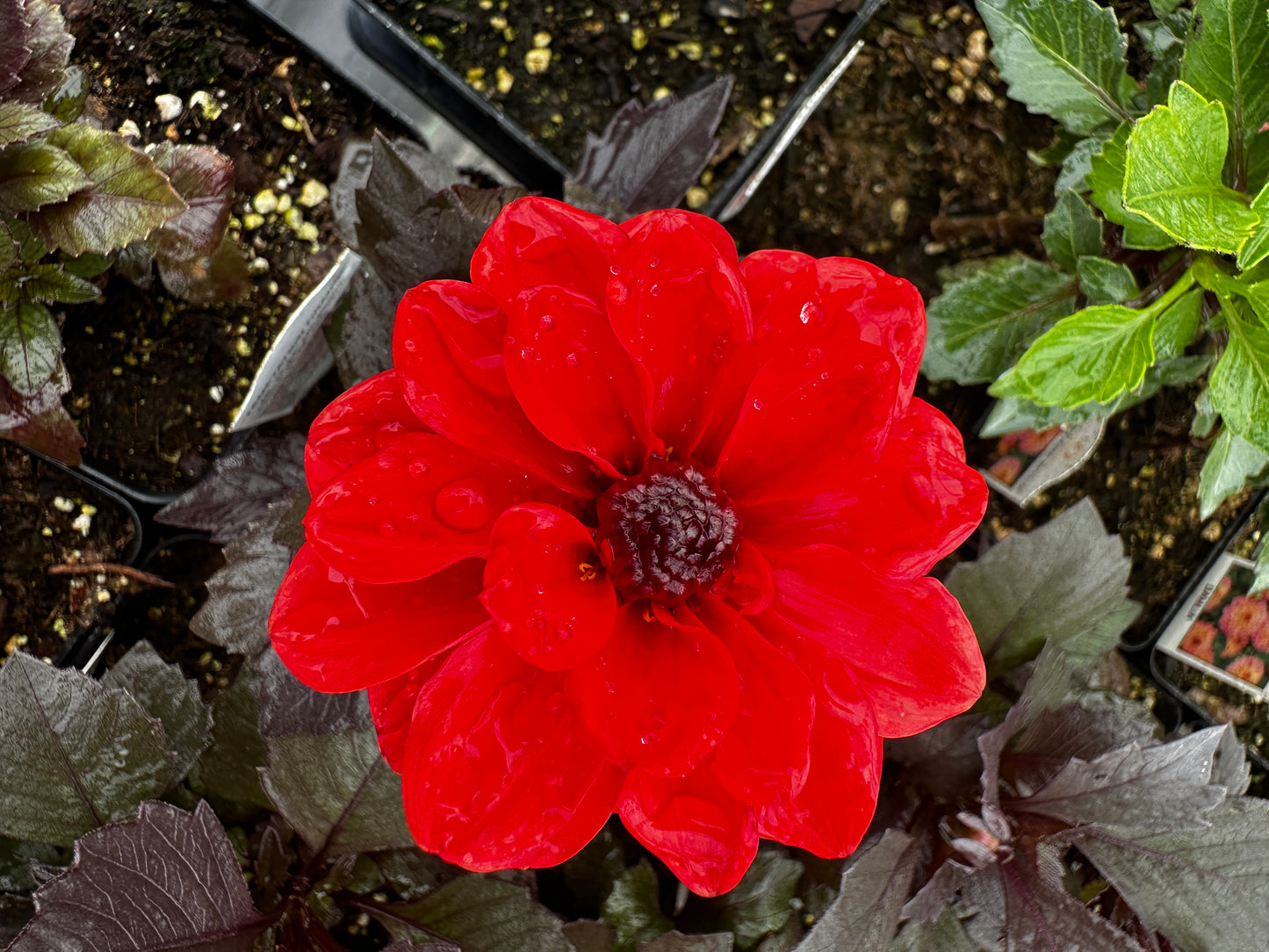Dahlia
Common Name: dahlia
Type: Herbaceous perennial
Family: Asteraceae
Zone: 7 to 10
Height: 1.00 to 6.00 feet
Spread: 1.00 to 3.00 feet
Bloom Time: July to September
Bloom Description: Red, pink, lavender, purple, orange, yellow and white
Sun: Full sun
Water: Medium
Maintenance: Medium
Suggested Use: Annual
Flower: Showy
Attracts: Butterflies
Tuberous roots must be lifted in fall in the St. Louis area. Although generally winter hardy to USDA Zones 7-10, many gardeners in those areas still lift and store the roots each winter because such care usually enhances plant performance. Plant tubers outside in spring 1-2 weeks before the last frost date (or start earlier indoors in pots) in organically rich, medium moisture, well-drained soils in full sun. Best flowering occurs in full sun, but plants generally appreciate some light, filtered shade in hot summer climates. Site in locations sheltered from strong winds. Plant taller varieties to 6-7" deep and shorter varieties to 2-3" deep. Spacing (1' to 3' apart) depends upon size of variety. For taller varieties (particularly those over 4' tall), consider the following planting procedure: (a) dig a 1-foot deep hole for each plant, amending the soil as needed, (b) return 6" of soil to the hole, (c) plant roots and cover with an inch or so of dirt and (d) gradually add the remaining soil as the shoots grow upward. pinch back taller varieties to promote bushy growth. Taller varieties usually need staking which should be put in place next to the roots at the time of planting. Tie stems to stakes with strips of soft cloth or nylon stocking. Feed plants monthly with low nitrogen fertilizers. Provide consistent moisture during the growing season and do not allow soils to dry out. Deadhead spent flowers to promote growth of additional flower buds. After first frost, carefully lift tuberous roots, dry for one day, dust with a fungicide and store in a cool location in damp peat (tubers will rot if peat is wet). Inspect roots periodically during winter to insure peat does not dry out. Smaller varieties are excellent container plants that must also be overwintered in a frost-free location.
For more information visit: Missouri Botanical Garden
Type: Herbaceous perennial
Family: Asteraceae
Zone: 7 to 10
Height: 1.00 to 6.00 feet
Spread: 1.00 to 3.00 feet
Bloom Time: July to September
Bloom Description: Red, pink, lavender, purple, orange, yellow and white
Sun: Full sun
Water: Medium
Maintenance: Medium
Suggested Use: Annual
Flower: Showy
Attracts: Butterflies
Tuberous roots must be lifted in fall in the St. Louis area. Although generally winter hardy to USDA Zones 7-10, many gardeners in those areas still lift and store the roots each winter because such care usually enhances plant performance. Plant tubers outside in spring 1-2 weeks before the last frost date (or start earlier indoors in pots) in organically rich, medium moisture, well-drained soils in full sun. Best flowering occurs in full sun, but plants generally appreciate some light, filtered shade in hot summer climates. Site in locations sheltered from strong winds. Plant taller varieties to 6-7" deep and shorter varieties to 2-3" deep. Spacing (1' to 3' apart) depends upon size of variety. For taller varieties (particularly those over 4' tall), consider the following planting procedure: (a) dig a 1-foot deep hole for each plant, amending the soil as needed, (b) return 6" of soil to the hole, (c) plant roots and cover with an inch or so of dirt and (d) gradually add the remaining soil as the shoots grow upward. pinch back taller varieties to promote bushy growth. Taller varieties usually need staking which should be put in place next to the roots at the time of planting. Tie stems to stakes with strips of soft cloth or nylon stocking. Feed plants monthly with low nitrogen fertilizers. Provide consistent moisture during the growing season and do not allow soils to dry out. Deadhead spent flowers to promote growth of additional flower buds. After first frost, carefully lift tuberous roots, dry for one day, dust with a fungicide and store in a cool location in damp peat (tubers will rot if peat is wet). Inspect roots periodically during winter to insure peat does not dry out. Smaller varieties are excellent container plants that must also be overwintered in a frost-free location.
For more information visit: Missouri Botanical Garden




